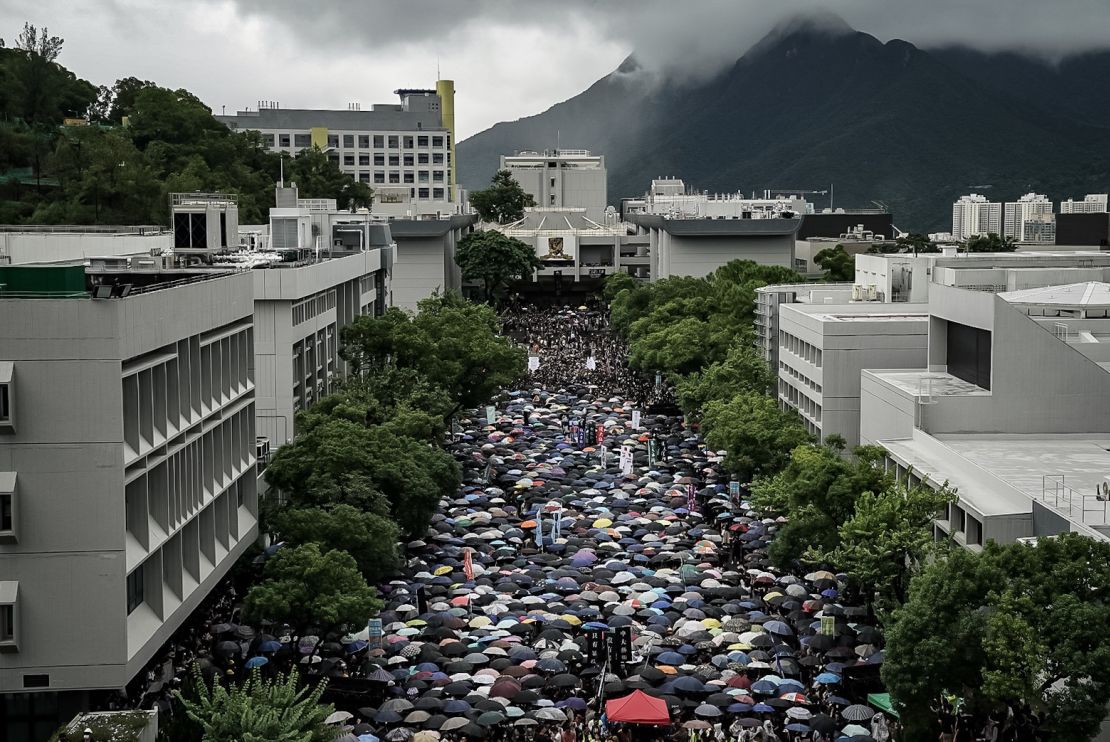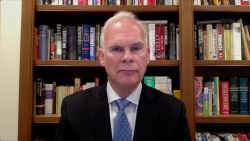Hong Kong’s beleaguered leader Carrie Lam says she never contemplated discussing her resignation with China’s central government, after a leaked audio recording revealed her saying she would like to quit.
In the recording obtained by Reuters and published Monday night, Lam can be heard saying in a closed-door meeting that she would stand down if she could. She also blamed herself for causing “unforgivable havoc” that has led to months of anti-government protests in the city.
In a press conference on Tuesday, the Hong Kong Chief Executive emphasized that she had not tendered a resignation to Beijing, nor even “contemplated to discuss a resignation” with her mainland superiors.
“The choice of not resigning is my own choice,” she told reporters. “I told myself repeatedly in the past few months that I – and my team – should stay on to help Hong Kong and to help Hong Kong in a very difficult situation.”
“I’d rather stay on and walk this path together with my team and the people of Hong Kong,” she said.
When asked by CNN why the Chinese central government would not let her resign, Lam reiterated that she had never tendered her resignation to Beijing.
Lam added that she was “very disappointed” that her remarks – spoken last week to a group of business leaders – had been recorded and passed to the media. The conversation had been held under the understanding that participants could use any information divulged, but should not reveal the identity of the speaker or any other participants.
In an email to CNN on Monday night, Lam’s office said that it was “not in a position to comment on what the chief executive has said at those events.”
At a press conference Tuesday, China’s Hong Kong and Macau Affairs Office spokesman Yang Guang reaffirmed China’s support for Lam, saying the situation in Hong Kong was “complex and grim” with “thugs” committing “horrendous crimes.” He urged Hong Kong to focus on economic issues, such as housing difficulties and the income gap.
Hong Kong entered its 13th consecutive weekend of unrest on Saturday and Sunday, which saw violent clashes and unauthorized protests, as well as choked access to the city’s international airport.
What was on the leaked tape
In the recording obtained by Reuters, Lam told a group of business leaders that she deeply regretted pushing the controversial extradition bill that first sparked mass demonstrations in June, but insisted that it had been her decision to do so.
“This is not something instructed, coerced by the central government,” Lam said during the 24-minute recording, Reuters reported.
“If I have a choice,” she said, speaking in English, “the first thing is to quit, having made a deep apology.”
“We were not sensitive enough to feel and grasp” the “huge degree of fear and anxiety amongst people of Hong Kong vis-à-vis the mainland of China,” she added.
“For a chief executive to have caused this huge havoc to Hong Kong is unforgivable.”

Protests began in June over the extradition bill – which would have allowed people accused of crimes in China to be extradited to the mainland – but have since mushroomed into a broader pro-democracy movement and a push for an inquiry into alleged policy brutality.
Lam has apologized for the now-shelved bill, but pressure has been growing for her to find a way out of the political crisis, which has begun to severely impact the city’s economy.
In the recording, Lam also told business leaders that her inability “to offer a political situation in order to relieve the tension” was her “biggest sadness.”
She said that while it is not the time for “self-pity,” she was frustrated that she could not “reduce the pressure on my frontline police officers” or is able to “pacify the large number of peaceful protesters who are so angry with the government, with me in particular.”
Lam added that it had taken a toll on her personal life. “Nowadays it is extremely difficult for me to go out,” she said. “I have not been on the streets, not in shopping malls, can’t go to a hair salon. I can’t do anything because my whereabouts will be spread around social media.”
China ‘willing to play long’
Last month, images of Chinese military forces gathering in Shenzhen raised fears that Beijing could use its military might to quash protests.
In the leaked audio, Lam said that China was “willing to play long” and ride out the unrest – even if it damaged Hong Kong’s economy and tourism – and that Beijing was aware of the possible reputational damage if it sent troops in to shut down protests.
“They know that the price would be too huge to pay,” she said, according to the recording obtained by Reuters. “They care about the country’s international profile.
“It has taken China a long time to build up to that sort of international profile and to have some say, not only being a big economy but a responsible big economy, so to forsake all those positive developments is clearly not on their agenda.”

During Tuesday’s Hong Kong and Macau Affairs Office press conference, spokeswoman Xu Luying told reporters that China was confident in the Hong Kong government, though she added that Beijing cannot stand by if the situation deteriorates.
The summer of dissent continues
Some believed that Monday – the first day back at school after the summer break – could be a turning point for Hong Kong’s protest movement, marking the end of the city’s summer of unrest.
Instead, thousands of high school and university students skipped class and braved the city’s rainy weather to protest, with some wearing their school uniform while they rallied. Some students have indicated that they’re planning to boycott classes for the next two weeks.
A letter from Hong Kong’s Education Bureau which was sent to parents said that it was “strongly opposed to class boycotts,” noting that the demonstrations could affect school operation and undermine students’ ability to learn. “Please dissuade your children from joining,” said the letter, which was dated August 29 and signed by the Secretary for Education Kevin Yeung.
On Monday night, protests again took an aggressive turn. Police arrested 23 people after protesters threw rotten eggs, corrosive liquid, rocks and stones at the Mong Kok police station in Kowloon on Monday night, District Commander District Bradley Wright said at a press conference on Tuesday. They were arrested for a range of offenses, including possession of an offensive weapon.
Although the city has seen large-scale, peaceful marches during the summer of dissent, Hong Kong has also been rattled by violence and numerous conflicts between police and protesters. Monday’s arrests bring the total number of people arrested to 1,140 since protests started in June. The youngest person known to have been arrested is 12 years old.

























